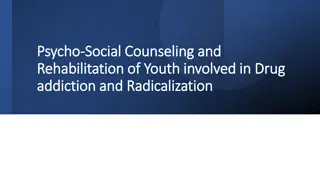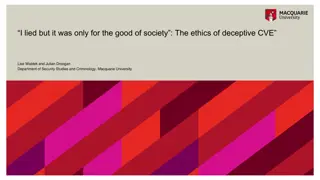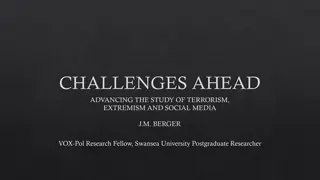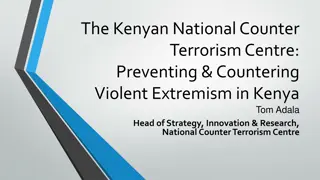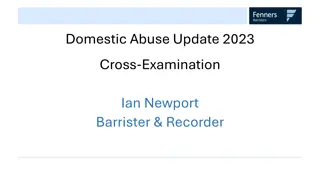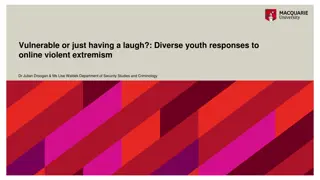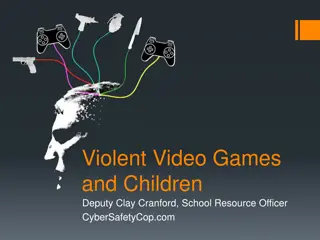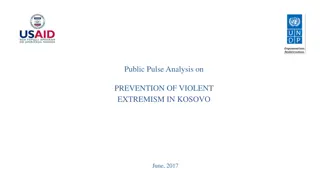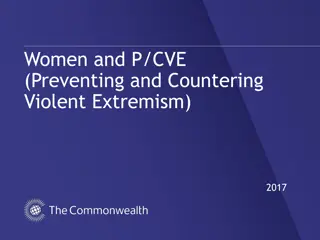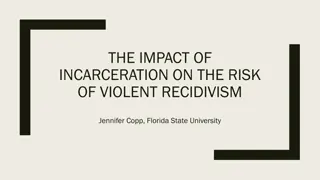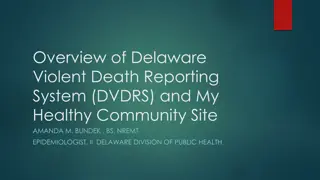Exploring Domestic Radicalization and Violent Extremism Research at NIJ
The National Institute of Justice focuses on understanding the drivers of radicalization, exploring effective prevention strategies, and evaluating the evolving threats of extremism in the U.S. Research efforts aim to synthesize findings to address the complexities of domestic extremism, emerging topics, and new areas of focus. The program continues to adapt to enhance knowledge, interventions, and safeguard democratic principles.
Download Presentation

Please find below an Image/Link to download the presentation.
The content on the website is provided AS IS for your information and personal use only. It may not be sold, licensed, or shared on other websites without obtaining consent from the author. Download presentation by click this link. If you encounter any issues during the download, it is possible that the publisher has removed the file from their server.
E N D
Presentation Transcript
The Domestic Radicalization and Violent Extremism Research Portfolio at the National Institute of Justice Aisha J. Qureshi Social Science Analyst Office on Violence and Victimization Prevention August 29, 2023
Todays Presentation What is the National Institute of Justice? Portfolio Overview: Program History Purpose and Goals of the Program Funding Mechanisms NIJ Review Process Progress and Dissemination of Research Efforts Synthesizing research Finals reports Projects nearing completion Looking Forward Resources Questions Introduction to Synthesis Exercises
The National Institute of Justice The research, development and evaluation agency of the U.S. Department of Justice Goals: To improve knowledge and understanding of crime and justice issues through science
Program History Aftermath of 9/11 New mandate by Congress in 2012 to carry out: research targeted toward developing a better understanding of the domestic radicalization phenomenon, and advancing evidence-based strategies for effective intervention and prevention. Eleven consecutive years Over 50 awards made
Initial Program Goals and Priorities To understand: 1. Primary drivers of radicalization 2. Violent extremism vs. other forms of mass violence 3. Policies/programs effective in: 1. Prevention 2. Intervention 3. Disengagement 4. Deradicalization
Evolving Threats, Evolving Research Global trends Frequency and lethality of terrorist attacks in America COVID-19 pandemic January 6 insurrection
Shifts in Direction 1. An increase in the amount of resources available 2. New topics of interest related to radicalization and extremism as identified by Congress 3. Emerging areas of emphasis denoted in the solicitation 4. Diversity of Perspectives
Current Purpose & Goals Increase knowledge of radicalization in the U.S. Bolster evidence-based prevention and intervention strategies New Areas of Focus + Considerations Communication Reintegration Safeguarding of democratic principles and institutions Long term drivers of radicalization Diversity in extremism research
Areas of Focus Topic Area 1: Research to Inform Terrorism Prevention Efforts Topic Area 2: Research on the Role of Communications in Promoting and Countering Extremist Content and Information Topic Area 3: Research on Disengagement, Deradicalization, and the Reintegration Into Society of Individuals Incarcerated for Terrorism Related Offenses Topic Area 4: Evaluations of Programs and Practices to Prevent Terrorism
$7.5 million Domestic violent domestic extremist ideologies Safeguarding of democratic principles and institutions Long term drivers of radicalization MDM the broader role of communications Diversity in extremism research
External Peer Review Panels of experts Technical and practitioner reviewers Independent scores and comments Returned to NIJ for review
External Peer Review Selection Criteria Statement of the Problem 15% Understanding of the problem, research questions, and awareness of the state of current research Project Design and Implementation 45% Quality and technical merit Feasibility of project and soundness of methods Awareness of potential pitfalls and how to mitigate them Potential Impact 20% Ability of the project to contribute a significant scientific or technical advancement to the field Capabilities/Competencies 15% Demonstrated productivity and experience of the applicant organization and proposed project staff Relationship between the capabilities/competencies of the proposed project staff and the scope/strategies of the project Budget 5%
Internal Review Consists of NIJ scientific staff, NIJ leadership, and other subject matter experts Review external peer review scores and comments Formulate funding recommendations All funding decisions are made at the discretion of the NIJ Director!
Proposals should be: Well-written Innovative Timely Rigorous and well-designed Feasible Impactful
Deliverables Include 1. Progress reports 2. Final Research Report 3. Associated data sets or files 4. Scholarly products
What We Have Learned Synthesis Papers How Radicalization to Terrorism Occurs in the United States: What Research Sponsored by the National Institute of Justice Tells Us Risk Factors and Indicators Associated With Radicalization to Terrorism in the United States: What Research Sponsored by the National Institute of Justice Tells Us
What We Have Learned Individual Studies A Comparative Study of Violent Extremism and Gangs Empirical Assessment of Domestic Disengagement and Deradicalization (EAD3) Research and Evaluation on Domestic Radicalization to Violent Extremism: Research to Support Exit USA The Longevity of American Terrorists: Factors Affecting Sustainability Evaluating the Safe Spaces Program: Using a Community-based Public Health Approach to Prevent Violent Extremism
Current/Recently Completed Awards Community Reporting Thresholds: Sharing Information with Authorities Concerning Terrorism Activity Research on Domestic Radicalization to Violent Extremism: Insights from Family and Friends of Current and Former Extremists Exploring the Social Networks of Homegrown Violent Extremists (HVE) Military Veterans Applying a Development Evaluation Approach to Address Community Safety and Health Challenges of Reintegration Programs in the USA Risk and Rehabilitation: Supporting the Work of Probation Officers in the Community Reentry of Extremist Offenders
Progress Twelve consecutive years 50+ awards made
Dissemination Campaign Research for the Real World January, 2022 Dedicated NIJ Journal Issue Fall, 2023 Podcasts 2022 - 2023
A New Synthesis Initiative Synthesis papers and Five Things Fall, 2023
More Information NIJ Domestic Radicalization & Violent Extremism Portfolio: www.nij.gov keyword: radicalization Forthcoming publications/resources will be delivered to your email!
QUESTIONS & ANSWERS DISCUSSION AISHA.QURESHI@USDOJ.GOV


